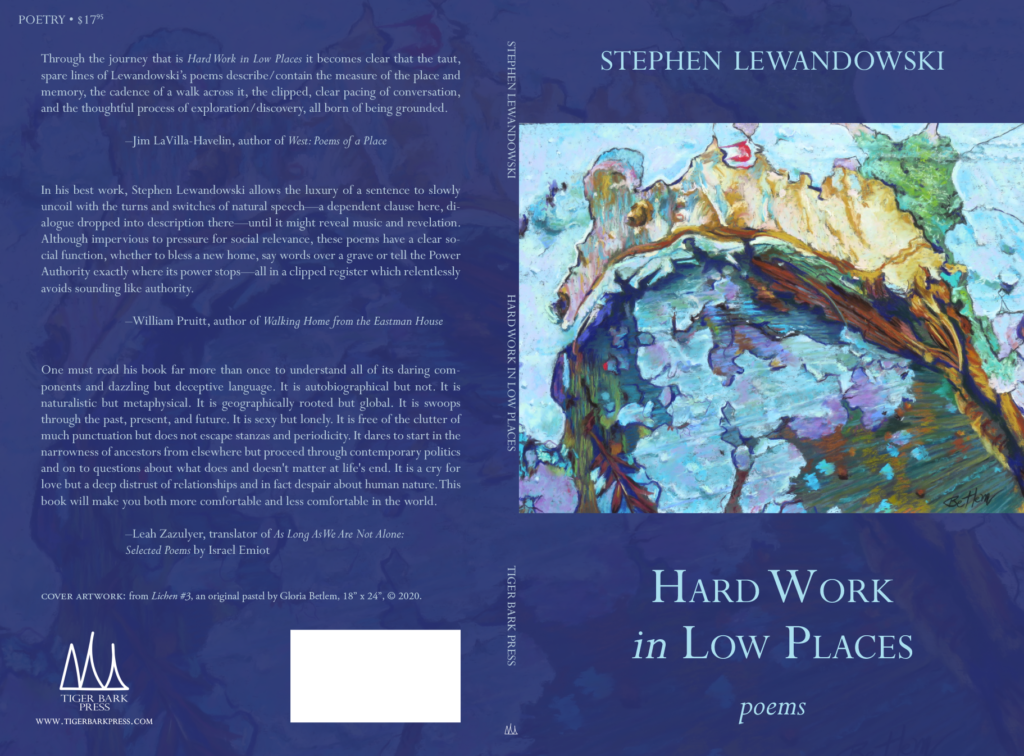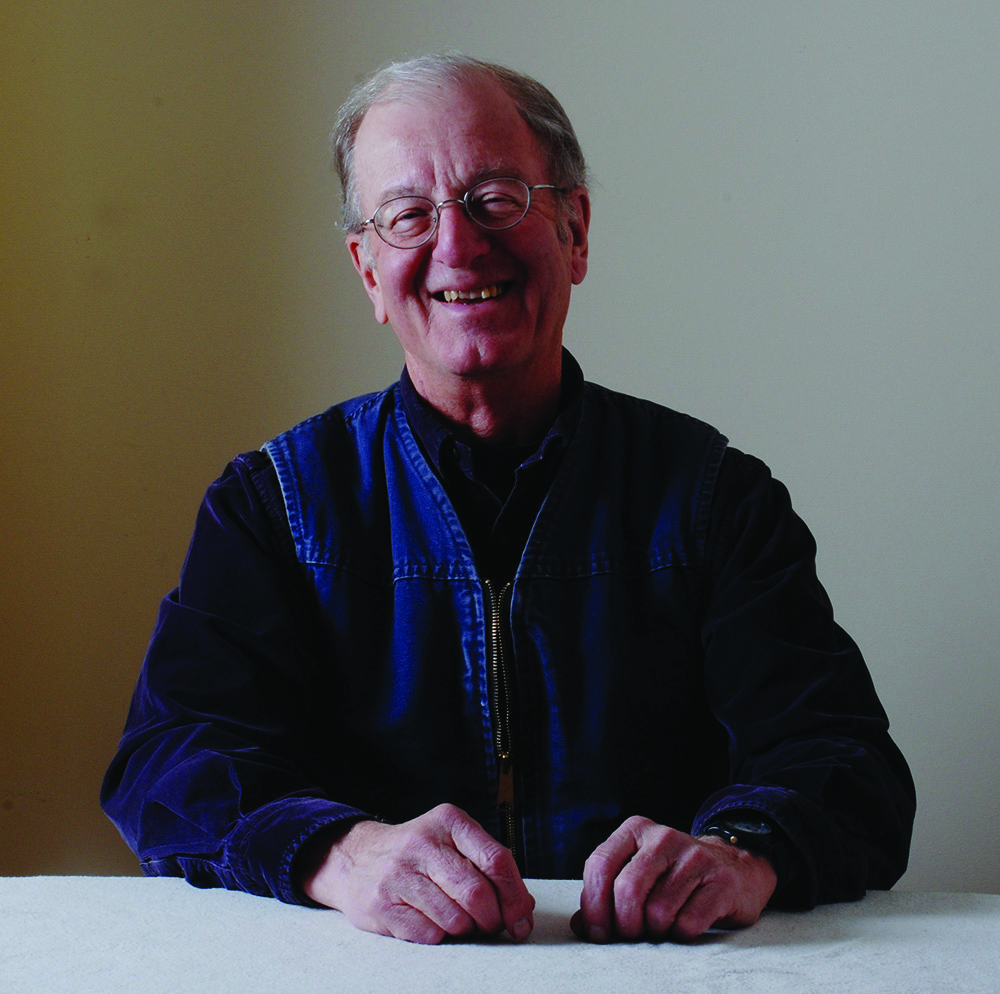Poetry from STEPHEN LEWANDOWSKI
PILLARS
Four story, brick courthouse
plus cupola stands at the center
of a lawn groomed by jail trustees.
Beneath the gilded dome
judges and juries sit in
courtrooms lined with dark oil
paintings of the county’s founders.
Atop the dome stands
a gilded statue of Blind Justice
scales in hand but too large
for the rest of the building.
The gold dome and statue are lit
by floodlights all night.
During the days of warm weather
out-patients from the VA Hospital
curl up to sleep on the wide lawn
and dream that, cured of
madness, alcoholism and old age,
as new men they walk the streets
of their hometowns.
MY OLD HEART
Rocky highlands
south of here
are full of deer.
When roused at dusk
by a walker
they flee away
white tails held erect.
Long after their bodies
fade into the brush
you can follow
the flash & flare
of their tails
bounding away.
A woman who lives alone
high in sun rise and set
beside the highlands’
shady gullies and glens
can be chased but
will not be caught.
You would be a fool
to pursue her.
STERLING/STARLING
The name was first given
but not taken, what can
they mean by “easterling”?
What compass brings
people out of the east,
what venture? They bring
refined silver to trade for brides
or failing that, just to take them.
Little star, you bird of many colors
all black iridescent, bright of eye
yellow-billed and -legged.
In what script was your name
first written then understood
by the Scots to mean
“new people, not like us”?
A cloud of birds wheeling
low then high, synchronized
flight, a form outlined against
sunset, a mark, a letter, a word,
comma, ampersand, period,
exclamation point constantly
shifting text singing in flight.
BREAKFAST ALONE
While I was out clipping
three purple irises
from half-wild stalks,
the coffee pot boiled over
splattering across the stove.
Walking back in, I found
the kitchen already full
of breakfast smell but
made room on the cluttered
table for a canning jar
holding filmy flowers.
CARETAKER OF THE DARK SIDE
My hands are rough with spring work.
All winter they were soft
from oils, creams and lotions
spread on the skin you couldn’t reach
after baths, before bed.
I called it your “dark side”
you know, like the moon.
These hands held you and
even now long to return
to smooth your hip,
breast, neck, and cheek.
These hands offer me solace,
rub together, pull an ear
and hide my face.
Close to you for months, finally
I learned these hard hands
held and smoothed surfaces
which will have to be enough.
All images and poetry ©2021
STEPHEN LEWANDOWSKI and TIGER BARK PRESS
Notice of Publication- May 21, 2021
Editor’s Note: During a recent encounter, I asked Stephen to comment on J. P. “Sandy” Seaton’s description of him as an “American Poet.”
“You would have to ask him,” he responded, adding that Seaton’s perspective is influenced by his experience as a translator from the Chinese. “What I say is not obscure. It is straight forward, clear, does not need interpretation.American English is a language unto itself.”

Tiger Bark Press, a literary press located in Rochester, NY is happy to announce the publication of a selection of poems by Stephen Lewandowski, Hard Work in Low Place , his fifteenth in a writing career spanning five decades.
J. P. “Sandy” Seaton, translator from the Chinese, poet and professor emeritus offers these comments on Lewandowski’s recent work, “This is American poetry. American poetry doesn’t get any better than this. You could be misled by reading a better known poet than Lewandowski about the nature of American poetry, about what it is to be an American and about nature itself. If you don’t know what nature is but want to know, read this book.”
Who is Stephen Lewandowski? As a poet he has followed twisting, sometimes seemingly contradictory paths. He was a Conscientious Objector to the Vietnam War. He objects as well to seeing poetry run as a business, a lottery, prizes. He’s never entered one of his poems in any contest. As a student many years ago, he studied English Literature for a BA at Hamilton College in the Mohawk Valley.
Lewandowski spent a year at Pendle Hill, a Center for Study and Contemplation, studying with Maurice Friedman, translator and biographer of the philosopher Martin Buber. He did graduate work in philosophy at Washington University in St. Louis and studied with poet Howard Nemerov. As was common with Nemerov, he advised “the world has enough poets, do something else.” He studied American Folk Culture at the Cooperstown Graduate Programs where he worked with Dr. Louis Jones, author of Things That Go Bump in the Night.
Finally, needing a job and sort of heeding Nemerov’s proclamation, he found one with the USDA Soil Conservation Service and worked for nearly forty years on the application of best management practices to agriculture, watershed management and environmental analysis. He spent the last ten years of his working life consulting with the Canandaigua Lake Watershed Association and the Lake Ontario Coastal Initiative.
When poet and publisher Bob Arnold says, “Here is a sure, durable and unsentimental chorus of poems to love and landscape- or as Lewandowski likes to describe the hills of the Finger Lakes district of western New York, ‘there are/ hills upon hills walking/ the day away in the woods’—he may be describing himself. Take this book by the hand,” he is describing a spirit at home in place.
Further, poet and critic Michael Rothenberg describes Lewandowski’s poems as “a quiet walk, careful, clear, in the moment, full of nature and desire.” Lewandowski’s poems often describe a recognizable place and a reaction to it that the reader might share. Retired professor John Guzlowski puts it this way, “Like Emerson and Thoreau, Stephen has the gift of sensing spiritual facts beneath the natural facts he sees so clearly and describes so exactly…. He brings us to place and somehow shows us the mystery there.”
Some might say Lewandowski has led two lives, but it’s more like he’s led the life his curiosity and his desire to write poems has led him to. He loves his environmental work and brings the same passions to it that enliven his poetry. He loves the land from which his poems spring. Native American poet Joseph Bruchac put it this way, “Steve Lewandowski’s poetry draws from the same sure quiet sources as the old Chinese poets of the T’ang Dynasty. His work is rooted in the earth of the Finger Lakes and his reverence for that soil would be appreciated by the Cayuga people whose presence is still felt there….”
Other, more famous poets like William Stafford and Ted Kooser have expressed their interest in and enthusiasm for Lewandowski’s poems. Lewandowski has never seen poetry as a career, nor does he view his environmental work in that light. He would invite you to read a poem or two, think about it, and see where it takes you. Poet and translator Leah Zazulyer says, “It’s naturalistic but metaphysical.”
Hard Work in Low Places is now available from
Tiger Bark Press (google it) and Lewandowski is willing and able to visit your forum or gathering for a reading and talk.
Contact him through email at stachu14512@yahoo.com
or (585) 554-4899.

Stephen Lewandowski has published fifteen large and small books of poetry, and his poems and essays have appeared in regional and national environmental and literary journals and anthologies. He was student of philosopher Maurice Friedman, poet Howard Nemerov, a graduate assistant to philosophical essayist William Gass, and later studied with folklorist Louis Jones (Things That Go Bump in the Night).He is co-cordinator with Scott Williams of the Sea of Coffee Open Mic. at the Dalai Java coffeeshop in Canandaigua on third Sunday afternoons. His most recent book of poems is Hard Work in Low Places (see page 11 of July Owl Light) from Tiger Bark Press of Rochester, NY (June, 2021). He is currently working on a Journal of the Pandemic Year.